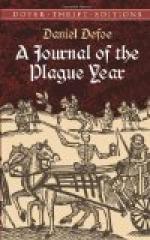But they might as well have talked to the air; for the people of London thought themselves so plague-free now, that they were past all admonitions. They seemed to depend upon it that the air was restored, and that the air was like a man that had had the smallpox,—not capable of being infected again. This revived that notion that the infection was all in the air; that there was no such thing as contagion from the sick people to the sound; and so strongly did this whimsey prevail among people, that they run altogether promiscuously, sick and well. Not the Mohammedans, who, prepossessed with the principle of predestination, value[311] nothing of contagion, let it be in what it will, could be more obstinate than the people of London. They that were perfectly sound, and came out of the wholesome air, as we call it, into the city, made nothing of going into the same houses and chambers, nay, even into the same beds, with those that had the distemper upon them, and were not recovered.
Some, indeed, paid for their audacious boldness with the price of their lives. An infinite number fell sick, and the physicians had more work than ever, only with this difference, that more of their patients recovered, that is to say, they generally recovered; but certainly there were more people infected and fell sick now, when there did not die above a thousand or twelve hundred a week, than there was[312] when there died five or six thousand a week, so entirely negligent were the people at that time in the great and dangerous case of health and infection, and so ill were they able to take or except[313] of the advice of those who cautioned them for their good.
The people being thus returned, as it were, in general, it was very strange to find, that, in their inquiring after their friends, some whole families were so entirely swept away that there was no remembrance of them left. Neither was anybody to be found to possess or show any title to that little they had left; for in such cases what was to be found was generally embezzled and purloined, some gone one way, some another.
It was said such abandoned effects came to the King as the universal heir; upon which we are told, and I suppose it was in part true, that the King granted all such as deodands[314] to the lord mayor and court of aldermen of London, to be applied to the use of the poor, of whom there were very many. For it is to be observed, that though the occasions of relief and the objects of distress were very many more in the time of the violence of the plague than now, after all was over, yet the distress of the poor was more now a great deal than it was then, because all the sluices of general charity were shut. People supposed the main occasion to be over, and so stopped their hands; whereas particular objects were still very moving, and the distress of those that were poor was very great indeed.




